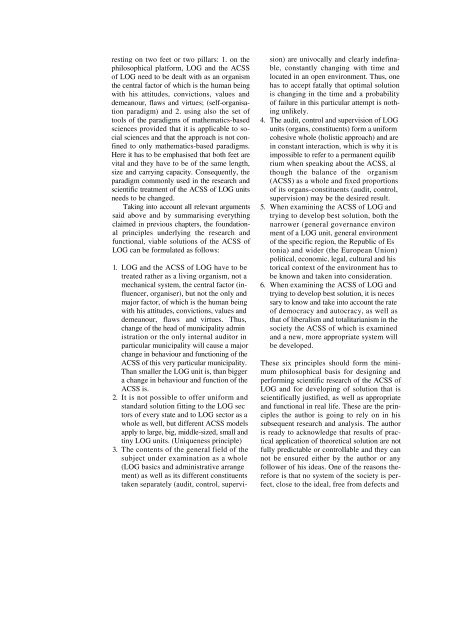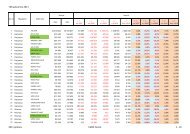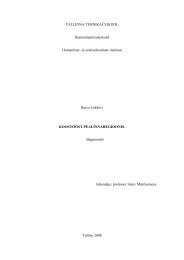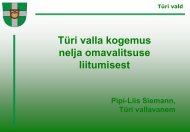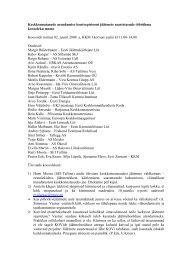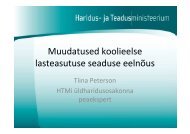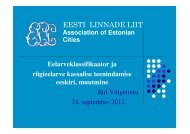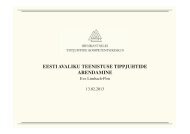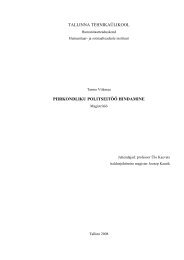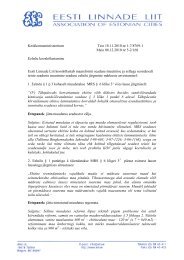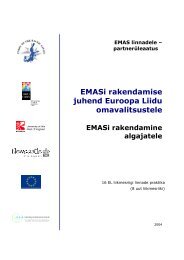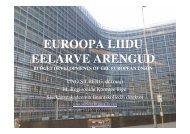Theoretical and Practical Problems Related to the Audit, Control and ...
Theoretical and Practical Problems Related to the Audit, Control and ...
Theoretical and Practical Problems Related to the Audit, Control and ...
Create successful ePaper yourself
Turn your PDF publications into a flip-book with our unique Google optimized e-Paper software.
esting on two feet or two pillars: 1. on <strong>the</strong><br />
philosophical platform, LOG <strong>and</strong> <strong>the</strong> ACSS<br />
of LOG need <strong>to</strong> be dealt with as an organism<br />
<strong>the</strong> central fac<strong>to</strong>r of which is <strong>the</strong> human being<br />
with his attitudes, convictions, values <strong>and</strong><br />
demeanour, flaws <strong>and</strong> virtues; (self-organisation<br />
paradigm) <strong>and</strong> 2. using also <strong>the</strong> set of<br />
<strong>to</strong>ols of <strong>the</strong> paradigms of ma<strong>the</strong>matics-based<br />
sciences provided that it is applicable <strong>to</strong> social<br />
sciences <strong>and</strong> that <strong>the</strong> approach is not confined<br />
<strong>to</strong> only ma<strong>the</strong>matics-based paradigms.<br />
Here it has <strong>to</strong> be emphasised that both feet are<br />
vital <strong>and</strong> <strong>the</strong>y have <strong>to</strong> be of <strong>the</strong> same length,<br />
size <strong>and</strong> carrying capacity. Consequently, <strong>the</strong><br />
paradigm commonly used in <strong>the</strong> research <strong>and</strong><br />
scientific treatment of <strong>the</strong> ACSS of LOG units<br />
needs <strong>to</strong> be changed.<br />
Taking in<strong>to</strong> account all relevant arguments<br />
said above <strong>and</strong> by summarising everything<br />
claimed in previous chapters, <strong>the</strong> foundational<br />
principles underlying <strong>the</strong> research <strong>and</strong><br />
functional, viable solutions of <strong>the</strong> ACSS of<br />
LOG can be formulated as follows:<br />
1. LOG <strong>and</strong> <strong>the</strong> ACSS of LOG have <strong>to</strong> be<br />
treated ra<strong>the</strong>r as a living organism, not a<br />
mechanical system, <strong>the</strong> central fac<strong>to</strong>r (influencer,<br />
organiser), but not <strong>the</strong> only <strong>and</strong><br />
major fac<strong>to</strong>r, of which is <strong>the</strong> human being<br />
with his attitudes, convictions, values <strong>and</strong><br />
demeanour, flaws <strong>and</strong> virtues. Thus,<br />
change of <strong>the</strong> head of municipality admin<br />
istration or <strong>the</strong> only internal audi<strong>to</strong>r in<br />
particular municipality will cause a major<br />
change in behaviour <strong>and</strong> functioning of <strong>the</strong><br />
ACSS of this very particular municipality.<br />
Than smaller <strong>the</strong> LOG unit is, than bigger<br />
a change in behaviour <strong>and</strong> function of <strong>the</strong><br />
ACSS is.<br />
2. It is not possible <strong>to</strong> offer uniform <strong>and</strong><br />
st<strong>and</strong>ard solution fitting <strong>to</strong> <strong>the</strong> LOG sec<br />
<strong>to</strong>rs of every state <strong>and</strong> <strong>to</strong> LOG sec<strong>to</strong>r as a<br />
whole as well, but different ACSS models<br />
apply <strong>to</strong> large, big, middle-sized, small <strong>and</strong><br />
tiny LOG units. (Uniqueness principle)<br />
3. The contents of <strong>the</strong> general field of <strong>the</strong><br />
subject under examination as a whole<br />
(LOG basics <strong>and</strong> administrative arrange<br />
ment) as well as its different constituents<br />
taken separately (audit, control, supervi-<br />
sion) are univocally <strong>and</strong> clearly indefinable,<br />
constantly changing with time <strong>and</strong><br />
located in an open environment. Thus, one<br />
has <strong>to</strong> accept fatally that optimal solution<br />
is changing in <strong>the</strong> time <strong>and</strong> a probability<br />
of failure in this particular attempt is nothing<br />
unlikely.<br />
4. The audit, control <strong>and</strong> supervision of LOG<br />
units (organs, constituents) form a uniform<br />
cohesive whole (holistic approach) <strong>and</strong> are<br />
in constant interaction, which is why it is<br />
impossible <strong>to</strong> refer <strong>to</strong> a permanent equilib<br />
rium when speaking about <strong>the</strong> ACSS, al<br />
though <strong>the</strong> balance of <strong>the</strong> organism<br />
(ACSS) as a whole <strong>and</strong> fixed proportions<br />
of its organs-constituents (audit, control,<br />
supervision) may be <strong>the</strong> desired result.<br />
5. When examining <strong>the</strong> ACSS of LOG <strong>and</strong><br />
trying <strong>to</strong> develop best solution, both <strong>the</strong><br />
narrower (general governance environ<br />
ment of a LOG unit, general environment<br />
of <strong>the</strong> specific region, <strong>the</strong> Republic of Es<br />
<strong>to</strong>nia) <strong>and</strong> wider (<strong>the</strong> European Union)<br />
political, economic, legal, cultural <strong>and</strong> his<br />
<strong>to</strong>rical context of <strong>the</strong> environment has <strong>to</strong><br />
be known <strong>and</strong> taken in<strong>to</strong> consideration.<br />
6. When examining <strong>the</strong> ACSS of LOG <strong>and</strong><br />
trying <strong>to</strong> develop best solution, it is neces<br />
sary <strong>to</strong> know <strong>and</strong> take in<strong>to</strong> account <strong>the</strong> rate<br />
of democracy <strong>and</strong> au<strong>to</strong>cracy, as well as<br />
that of liberalism <strong>and</strong> <strong>to</strong>talitarianism in <strong>the</strong><br />
society <strong>the</strong> ACSS of which is examined<br />
<strong>and</strong> a new, more appropriate system will<br />
be developed.<br />
These six principles should form <strong>the</strong> minimum<br />
philosophical basis for designing <strong>and</strong><br />
performing scientific research of <strong>the</strong> ACSS of<br />
LOG <strong>and</strong> for developing of solution that is<br />
scientifically justified, as well as appropriate<br />
<strong>and</strong> functional in real life. These are <strong>the</strong> principles<br />
<strong>the</strong> author is going <strong>to</strong> rely on in his<br />
subsequent research <strong>and</strong> analysis. The author<br />
is ready <strong>to</strong> acknowledge that results of practical<br />
application of <strong>the</strong>oretical solution are not<br />
fully predictable or controllable <strong>and</strong> <strong>the</strong>y can<br />
not be ensured ei<strong>the</strong>r by <strong>the</strong> author or any<br />
follower of his ideas. One of <strong>the</strong> reasons <strong>the</strong>refore<br />
is that no system of <strong>the</strong> society is perfect,<br />
close <strong>to</strong> <strong>the</strong> ideal, free from defects <strong>and</strong>


